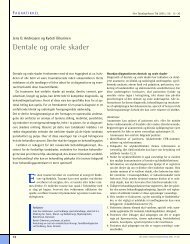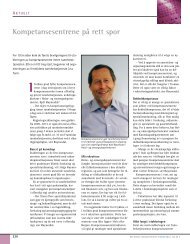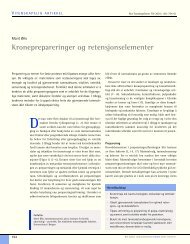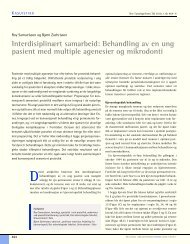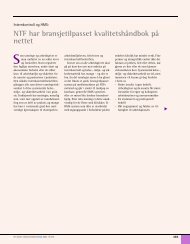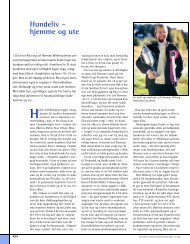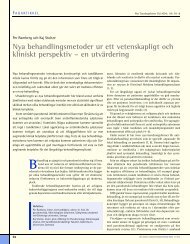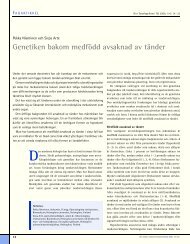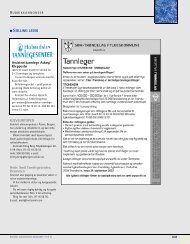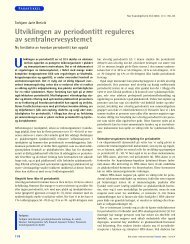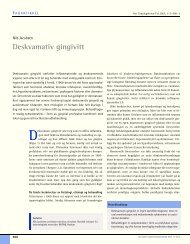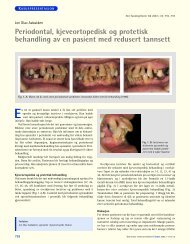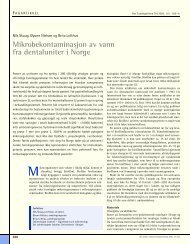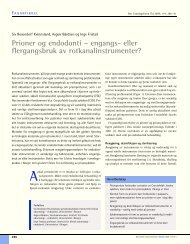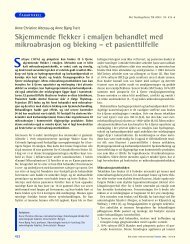Tinnitus - Den norske tannlegeforenings Tidende
Tinnitus - Den norske tannlegeforenings Tidende
Tinnitus - Den norske tannlegeforenings Tidende
Create successful ePaper yourself
Turn your PDF publications into a flip-book with our unique Google optimized e-Paper software.
eller eksponeringsterapi har blitt benyttet i enkelte fagkretser med<br />
godt resultat. I tilfeller hvor pasientene inntar en emosjonell holdning<br />
til sine tinnitusproblemer og går med en konstant frykt for at<br />
tilstanden skal forverres ytterligere, er det viktig at de får hjelp til å<br />
forstå og bekjempe sine følelser. Slik behandling krever imidlertid<br />
kompetanse utenfor det audiologiske og ørerelaterte fagfeltet.<br />
English summary<br />
Fuglem BJ, Kveberg K, Melkvik R.<br />
<strong>Tinnitus</strong> – a health problem for the individual and for society<br />
Nor Tannlegeforen Tid 2004; 114: 562–4.<br />
Epidemiological studies throughout the western world have revealed<br />
that a considerable percentage of the population suffers from tinnitus.<br />
The problem has been reported as far back as ancient Egypt, but<br />
we have reason to believe that the industrialization of modern society<br />
has lead to an increase in the problem. <strong>Tinnitus</strong> may arise from<br />
any part of the sound conducting anatomical system. Problems in<br />
the external and middle ear are usually subject to surgical treatment,<br />
while tinnitus arising from the internal ear, the 8 th cranial nerve and<br />
the central pathways to the auditory centers in the cortex, are naturally<br />
more difficult to treat. It is important, though, to be aware of<br />
the psychological component, as an etiological factor of tinnitus,<br />
and stress is therefore to be avoided in this group of patients.<br />
The article also deals with the natural protective mechanisms<br />
against sound impulses which exceed the tolerable limits.<br />
564<br />
Sound exposures in the dental environment may also be of such<br />
strength that over time it may have damaging effects on the auditory<br />
apparatus. <strong>Den</strong>tal personnel should be aware of this effect and take<br />
protective measures to safeguard themselves and their patients. Although<br />
attention to the problem of tinnitus has for some time been<br />
neglected, the medical profession is now more aware of it as a major<br />
health problem, and new methods of treatment are under investigation.<br />
Referanser<br />
1. Parow P. Hørselsskade fra ultralyd? Nor Tannlegeforen Tid 2003; 113:<br />
916.<br />
2. Jepsen O. Øre, nese og hals sygdomme. København: Munksgaard;<br />
1964.<br />
3. Brodal P. Sentralnervesystemet. 3. utg. Oslo: Universitetsforlaget;<br />
2001.<br />
4. Boron WF, Boulpaep EL. Medical Physiology. Philadelphia: Saunders;<br />
2003.<br />
5. Hørselhemmedes Landsforbund. <strong>Tinnitus</strong>- en samling artikler; 1998.<br />
6. Ellingsen KM. Når lyd blir ulyd. Hørselhemmedes Landsforbund;<br />
1992.<br />
Søkeord for nettversjon: www.tannlegetidende.no: Behandling; Hørsel;<br />
Lyd; Nerve; Symptom; Øre-nese-hals.<br />
Adresse: Bjørn Joh. Fuglem, Moxnessklinikken, 7011 Trondheim<br />
DEN NORSKE TANNLEGEFORENINGS TIDENDE 2004; 114 NR 11



